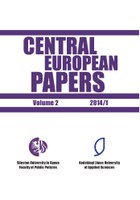The Development of Slovak-Hungarian Relations in 1939–1940 from a Soviet Aspect
The Development of Slovak-Hungarian Relations in 1939–1940 from a Soviet Aspect
Author(s): István JanekSubject(s): History
Published by: Slezská univerzita v Opavě, Fakulta veřejných politik
Keywords: History 1939–1941; Diplomacy; Slovak policy; Hungarian-Russian-Slovakian relations
Summary/Abstract: After concluding the Molotov-Ribbentrop Pact, the Soviet Union unexpectedly became an ally of the Slovaks. Slovak political decision-makers evaluated this act as a “historic turnaround”, which then enabled the realization of mutual solidarity between Germany and Russia. Soviet diplomats characterized Slovakia in their reports as a “gate facing the Balkans” and as an “eye” into the Western half of Europe. Slovak politicians saw in their relationship with the Soviet Union the possibility to seek a counterbalance against the German influence that was encumbering the country. Slovakia’s foreign policy was hoping that the Soviet Union as a Slavic brother state would support Slovakia in the Hungarian-Slovak conflict. The rivalry between Hungary and Slovakia, when both states had been attempting to gain Hitler’s favour since 1939, eventually led to their attempting to win points to military domain. Thus, both of the states became ensnared in the war against the Soviet Union, an effort which other satellite states also joined. According to Jozef Tiso, Slovakia needed to enter the war against the Soviet Union because it could thus gain a basis from which to regain her territories that had been annexed to Hungary. The relationship between both states was important from the point of view of the Soviet Union foreign policy because the Soviet Union was thus able to gain information about Germany, or as the case may be, it was able to restrain them from declaring war. In the fall of 1939 full diplomatic relations between Hungary and the Soviet Union were renewed, in which the German-Soviet rapprochement also played a role. Soviet diplomats attempted to keep their government informed in as much detail as possible about the Slovak-Hungarian relationships.
Journal: Central European Papers
- Issue Year: 2/2014
- Issue No: 1
- Page Range: 53-73
- Page Count: 21
- Language: English

